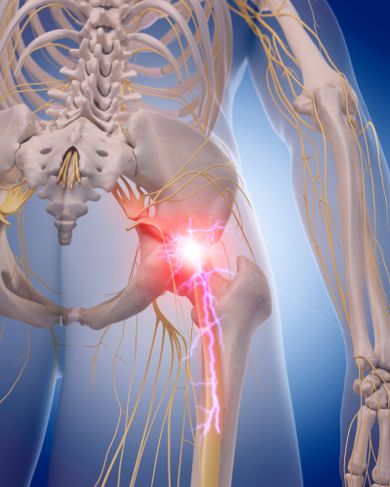The piriformis is a flat, pyramid-shaped muscle in the buttocks area, underneath the gluteus maximus muscle. The piriformis works with rotators such as the gemellus inferior and the obturator externus to help rotate the hip. When extended, the piriformis muscle rotates the thigh. This particular muscle is also close to the sciatic nerve, which is the largest nerve in the body. If you feel pain in that region, you might have piriformis syndrome. Keep reading to learn more about the causes, symptoms, and treatments.
What Is Piriformis Syndrome?
Piriformis syndrome is a common neuromuscular disorder. More than 200,000 new cases develop in the United States every year. The condition occurs when the piriformis muscle compresses the sciatic nerve. Pressure causes the muscle to spasm, leading to pain, numbness, or tingling in the buttocks. It might even extend down the back of your leg into the foot.
Symptoms of Piriformis Syndrome
Typical symptoms include:
- Pain down the back of the thigh, calf, and foot
- Pain when walking up stairs or inclines
- A dull ache in the buttock
- Increased pain after prolonged sitting
- Reduced range of motion in the hip joint
The pain can be dull or severe and could extend down the sciatic nerve.
What Causes Piriformis Syndrome?
The exact cause of piriformis syndrome is unknown. Several factors could lead to piriformis syndrome, including the following:
- Tightening of the muscle due to injury or spasm
- Swelling due to spasm or injury
- Bleeding in the area of the piriformis muscle
- Spasm, either because of irritation in the muscle itself or irritation of a nearby structure such as the sacroiliac joint or hip.
Visit Your Doctor
Although sore muscles or minor aches are common, especially after exercise, pain should go away on its own within a day or two.If the pain does not subside or you start experiencing any other symptoms, you should consult with your medical provider. That way, your doctor can diagnose your condition and rule out other causes.
Treatment Options for Piriformis Syndrome
There are multiple ways to help soothe sore muscles from piriformis syndrome including:
- Ice Packs and Ice Massage: Place an ice pack on the painful area for 5 to 15 minutes at a time. Repeat every two to four hours as needed. You can also try massaging the area with an ice cube.
- Heat Therapy: Place a heating pad on dull or severe aches. Like with the ice, it can rest on the sore spot for about 20 minutes at a time.
- Piriformis Injection: A local anesthetic and corticosteroid may be injected directly into the piriformis muscle to decrease pain and spasms.
- Botox Injection: injections may be helpful, especially if other treatment options are not helping.
Susceptibility of Piriformis Syndrome
People who sit for long periods of time, at a desk or in front of the television, are at higher risk. Additionally, if you do frequent, rigorous lower-body workouts, you might irritate the muscle. Stretching before exercising can prevent piriformis syndrome.
Preventing Piriformis Syndrome
The following practices can help prevent piriformis syndrome:
- Stretch before exercising
- Exercise regularly
- Maintain good posture when you are sitting, standing, or driving
- Avoid long periods of sitting or lying down in a position that puts too much pressure on your buttocks
- Lift objects by bending at the knees and squatting, rather than using the back.
Diagnosing Piriformis Syndrome
Your medical provider may need to run diagnostic tests to rule out other medical conditions before they can diagnose you with piriformis syndrome. There isn’t a specific test to diagnose piriformis syndrome, however. You and your doctor will discuss your symptoms in depth to determine diagnosis and treatment options.
Duration of Piriformis Syndrome
If you adhere to your doctor’s medical recommendations or self-care remedies, the condition should not last for more than a few days or weeks. In severe cases, it can take up to six months for the piriformis muscle to heal even with proper treatment.
Piriformis Syndrome and Everday Living
Your medical provider may recommend stretches to be done at home or with a physical therapist. If injections help your particular condition, it is important to attend all the appointments and follow-up with your doctor. As you are waiting for the muscle to heal, you might have to skip a gym for awhile. Luckily, the piriformis muscle usually heals with no longterm effects.

 Home
Home Health
Health Diet & Nutrition
Diet & Nutrition Living Well
Living Well More
More




















